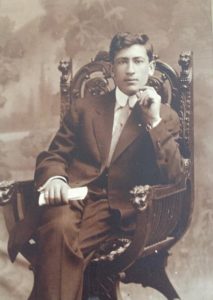
It seems like every Sunday after church, I’m confronted by the same question: “How many times have you been to Armenia?” I never have a sufficient answer regardless of whether the question is posed by a five-year-old, or one of the Nenes [grandmothers].
At this point, there really is no excuse – Armenianness has brought me to California, Italy and France (twice each); but I have not yet stepped foot on Armenian soil. I’m a reluctant pilgrim.
After years of feebly trying to justify why I haven’t been, I think it’s time to come clean. I need to confess something I think many Armenians in the Diaspora feel—especially in older generations—but are ashamed to admit: I am afraid of Armenia.
“Armenia” has always been a concept to me, which manifests itself in various forms. Conceptually, Armenia is standing on the dock at an Armenian-American summer camp, listening to oud-and-clarinet kef music, dancing the Michigan Hop, and screaming System of a Down lyrics on the bus back from a seminar. For me, Armenia has always been located in the small plot of land in Franklin, Massachusetts that makes up Camp Haiastan; the few blocks in East Watertown that are inhabited primarily by Armenians; and individual houses scattered across the Boston area. Armenia is at the foot of the Altar of St. Stephen’s Armenian Apostolic Church. It is on the field at AYF Olympics. It is in Stella’s Pizza on Mount Auburn Street during that half hour between Saturday School and Scouts.
But a few weeks ago, sitting in Donohue’s (the Irish Pub across from the Hairenik Building which headquarters the Armenian Weekly and Hairenik newspapers), I confided to some contemporaries that I have always assumed that I would visit Lebanon and Turkey before the Republic of Armenia.
“My understanding of being Armenian,” I explained, “and also my understanding of myself has always been contingent upon two critical experiences: living in Exile, and being a minority.”
The histories I inherited are that of a family of villagers making the crowded streets of Bolis [Istanbul] their new home; a refugee family maneuvering colonialism and ethnic war in Jerusalem and Amman; a girl sent alone from the Old Country to study theology in Chicago; and a locksmith renting a bed in Roxbury.
All of those histories revolve around being separated from a homeland, and existing as a minority in the country of residence.
So I worry about how I will mentally process the experience of visiting the only country in the world in which being Armenian does not make me a minority. When the youth-oriented opportunities to go to Armenia arise every summer, I habitually shrug them off. This year however, I finally rejected my gut instinct, and decided to go.

I want to focus on my great-grandfather for a moment. I have no idea what was going through Khachadoor Hampartsoomian’s head when he arrived in Boston in 1911. Perhaps wonder? Apprehension? The story goes that after the Massacres, when he stopped receiving letters from Kharpert, he started to gather tools in hopes of going and helping build up the infant Republic of Armenia. Then the Soviets took over, barring the entrance of anyone who believed in a free and independent Armenia. The Diasporan fate was sealed in exile.
Now that I am about to make the trip to Armenia that Khachadoor was never able to, I can no longer tiptoe around my fear of the Republic of Armenia, and what it will do to my mental construction of “Armenia.”
I am afraid that I will not cry when I see Mount Ararat after so many years of staring at it on the wall in the dining room. I am afraid that the Western Armenian that I have spoken (against all odds) since infancy, and now teach, will be influenced, molded and confused by my first real encounter with Eastern Armenian. I am afraid of the Russian words I will hear in the places where I expect Turkish. I am afraid that I will be told I’m not really Armenian. I am afraid that I will be indifferent to this nation-state that I’ve been told for so many years is mine to love. Most of all, I am afraid of my entire sense of self being shaken at its core, when the two qualities I have always used to define myself and my Armenianness are no longer applicable: exile and minority.
For in truth, even if the Republic of Armenia is “not really where we’re from” as the adults in my family say, how can I call myself exiled if I have “returned” to a homeland? How can I call myself a minority when upwards of 98% of the population is the same azk, the same ethnicity as me?
In avoiding Armenia all of these years, I and many others have sought to protect the purity of our Armenia(s) and our Armenianness: our Western Armenian, our traditional spellings, the stories of our ancestral villages.
When we obsess over any type of “purity”—linguistic, genetic, artistic or otherwise—we stunt our own progress, we finish the job the Ottoman authorities started at the turn of the century, and we effectively end our own story. A people that does not grow will not survive.
We as exiled Armenians must accept the Republic into our definition of Armenia, and the Republic must also accept the many versions of Armenia that we have been carrying and creating for 100 years.
I don’t know if I’m ready for a real, twenty-first century, “Europeanized,” non-Middle Eastern Armenia, but that is exactly why I must go.
Author information
The post I Am Afraid of Armenia appeared first on The Armenian Weekly.
Source: Armenian Weekly
Link: I Am Afraid of Armenia
